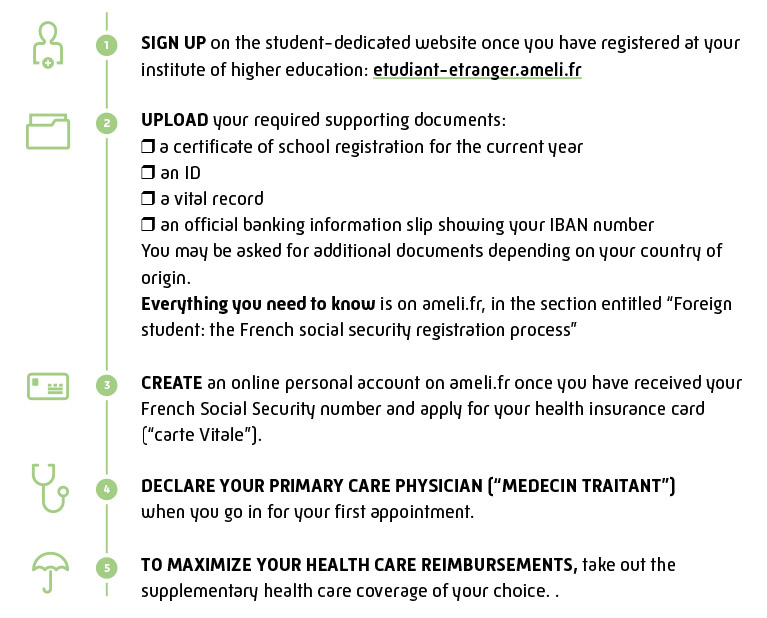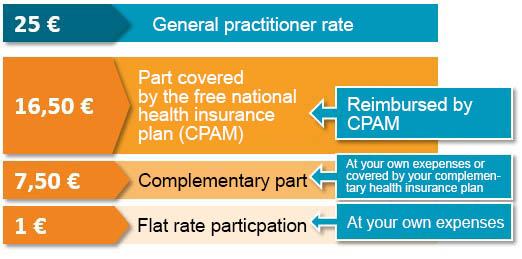FR | EN
France is well known for its health care system and the quality of the medical cares.
The Social Security system, available freely for all, backep up by a system of fee-paying but affordable complementary insurance plans, guarantees access to almost-free basic medical cares and emergency surgery, regardless of your age or nationality.
To fully benefits from the system, you will have to follow a few procedures and familiarize with the global health care system.
The sécurité sociale – CPAM is a national health insurance plan that allows full or partial reimbursements of your medical expenses in France:
- 70% of medical expenses
- 35 to 65% of drugs prescription
To claim additional reimbursement, or have access to certain cares with a very limited coverage by CPAM (dental and eye cares for instance), we recommend that you subscribe a fee-paying complementary insurance plan.
Affiliation to CPAM is mandatory and free for international students, except for European students holding the European Health Insurance Card.
The proof of CPAM affiliation will be required for various administrative procedure, including the renewal of your resident permit or the signature of a job contract.
To register to CPAM and get additional information regarding the French health care system (general practitioner, Vitale card, medical exams…), check the Ameli website dedicated to international students

Campus France Tutorial
Complémentaires santé privées
To supplement the reimbursements covered from the French national health care plan (CPAM), you can suscribe to a complementary health insurance plan (also known as « mutuelle » ou « complémentaire santé »).
As an example, here is the reimbursement chart for a consultation with a general practitioner, one of the most common medical act:

Having a complementary health insurance plan is not mandatory but strongly recommended especially if you plan to spend a full academic year in France or if you need specific and regular medical cares for an existing pathology
Those complementary plans are fee-paying: you will be charged a monthly fee that will vary depending of the type of plan you choose.
For your information, basic plans cost around 15€ per month and can cost over 40€ per month for premium plans
Here is a selection of insurance companies that have a long tradition of providing student’s health care plans:
La complémentaire santé solidaire
If you live in France and earn less than 9000€ per year, you can apply for the Complémentaire santé solidaire (also called CSS), which is free of charge, by sending the dedicated form to your CPAM.
The CSS application is longer and more complicated than subscribing to a private complementary health insurance, which is automatic.
Do not hesitate to contact the SSE to get help in this process.
University Healthcare Center (SSE)
Located on UNICAEN campus 1, the SSE gathers a team of health professionals: doctors, nurses, psychologist, psychiatrist and social workers. It provides students with free medical, psychological and social counseling.
It also contributes to supporting and integrating students with disabilities.
The general practitioner (GP)
Also called physician, the general practitioner receives on appointment at their practice. This is the professional that coordonates all your medical needs: you can go and see them when you get sick, when you are lightly injured or when you need an appointment with a medical specialist. They are also authorised to write drugs’ prescriptions.
To make a doctor’s appointment, the easiest way is to clong on to the Kedloc, Doctolib or Maiia platforms and search for an available general practitioner near your home.
The pharmacist
In addition to providing you with the drugs prescribed by your practitioner in case of sickness, pharmacists can also play a counseling role for light health issues (cold, sore throat, non-persistent headache…).
They will advise you with an off the counter treatment and, if necessary, direct you to your GP for further medical examination.
There is always a Pharmacy on duty in urban areas. In Caen, the Rives de l’Orne Pharmacy (near the train station) and la Grande Pharmacie du Progrés (tram stop “Saint Pierre”) are open 7 days a week.
Doctors on call / SOS médecins
If you are sick and cannot get an appointment with your regular physician (weekends, night time, national holidays), you can call SOS Médecins, a doctors on call service, at 36 24 (local call rate) or by making an online appointment directly on the SOS Médecins webportal at https://rdvasos.fr/
After a preliminary phone diagnostis, they will either give you an appointment call or direct you to the nearest ER unit.
The medical specialist
Unlike GPs, medical specialists have chosen to specialise in certain pathologies or specific parts of the human body.
Examples of specialists: ophthalmologist, gynaecologist, dermatologist, etc.
They conduct appointments at hospitals or in private practices
With some exceptions, you will need to go through your GP to get referred to a specialist and claim reimbursement for the consultation.
Specialists you can consult directly (without seeing your GP):
- gynaecologist
- ophtalmologist
- dentist
Hospital emergency units
In the event of severe injuries due to an accident, check into the nearest ER unit to receive urgent care or call 112 if you are not able to move (see below).
Please do not use hospital ER services because you cannot get an appointment with your GP, on weekends for instance. Contact SOS Médecins/Doctors on call or the 15 ; they will direct you to the ER if necessary..
- Dental emergencies: 02 31 85 18 13
- Eye emergencies: check into the Centre hospitalier universitaire (CHU) ER unit
One number for all emergencies: 112
112 is the European emergency number which can be called free of charge from any phone all over Europe, even if your cellphone plan does not provide European coverage.
- Dental emergencies: 02 31 85 18 13
- Eye emergencies: check into the Centre hospilalier universitaire (CHU) ER unit
If you have health problems that require accommodations for your studies, contact the relais Handicap Santé.

